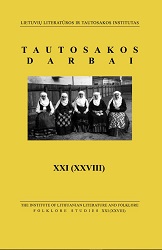„Nauji metai – nauji lapai“: Šiuolaikinės patarlių raidos tendencijos
“New Year, Fresh Leaves”: Modern Tendencies in the Development of Proverbs
Author(s): Dalia ZaikauskienėSubject(s): Customs / Folklore
Published by: Lietuvių literatūros ir tautosakos institutas
Keywords: recasts of traditional proverbs; acquiring denomination of anti-proverbs by the international paremiological research;
Summary/Abstract: A specific subspecies of the figurative phrases, as yet scarcely investigated by Lithuanian folklorists, gets introduced in this article – namely, the recasts of traditional proverbs, acquiring denomination of anti-proverbs by the international paremiological research. The author also discusses spheres of their creation and functioning, as well as attempting to establish their essential features and discern structural patterns of their formation. Creating parodies of traditional proverbs, their purposeful re-making (recasting, distortion) is an internationally well known and essentially not a very new phenomenon, enjoying enormous popularity, however, along with spread of the modern media technologies. The so-called anti-proverbs could be defined as purposefully created variants of traditional proverbs, wherein form and meaning of the traditional proverb get distorted in order to actualize some kind of idea or simply to achieve comical effect. According to the usage area, functions, and motivation of the re-making process, such recasts of Lithuanian traditional proverbs could provisionally be classified into “public” ones (made by the media or for advertising purposes), those belonging to the everyday speech, and playful ones (self-sufficient comical creations outside context). As a rule, the media uses anti-proverbs on purpose, in order to reflect some situation of the nowadays life. The key principle of their re-making in such instances is actualization, and the essential characteristics of such anti-proverbs – their high relevance. The Lithuanian anti-proverbs mostly tend to reflect political, economical, technological, scientific issues, less frequently – cultural and local ones. Such recasts of the proverbs are very short-living formations, being effective, incisive and attractive just as long as the situation they have been made to illustrate retains its importance. The so-called “relevant” anti-proverbs are possible to come upon also in the everyday speech; only here the issue they illustrate tends to be simpler, more down-to-earth and private. The anti-proverbs belonging to the everyday speech, or the daily level, usually are less ideologically charged than the “public” ones, being much simpler, and displaying softer kind of humor. The “daily” ones tend to be created just for fun, for entertainment and merry-making purposes, in order to demonstrate one’s wit and sense of humor. The so-called “playful” anti-proverbs usually do not aim at illustrating some concrete issue; they do not seem to perform any communicative function. Like in case of most “daily” anti-proverbs, their key-feature is playfulness: upon understanding the “rules of the game” one seems to be attempting to mess-up the traditional proverb as weirdly as possible, in order to achieve comical effect...
Journal: Tautosakos darbai
- Issue Year: 2004
- Issue No: 28
- Page Range: 127-137
- Page Count: 11
- Language: Lithuanian

